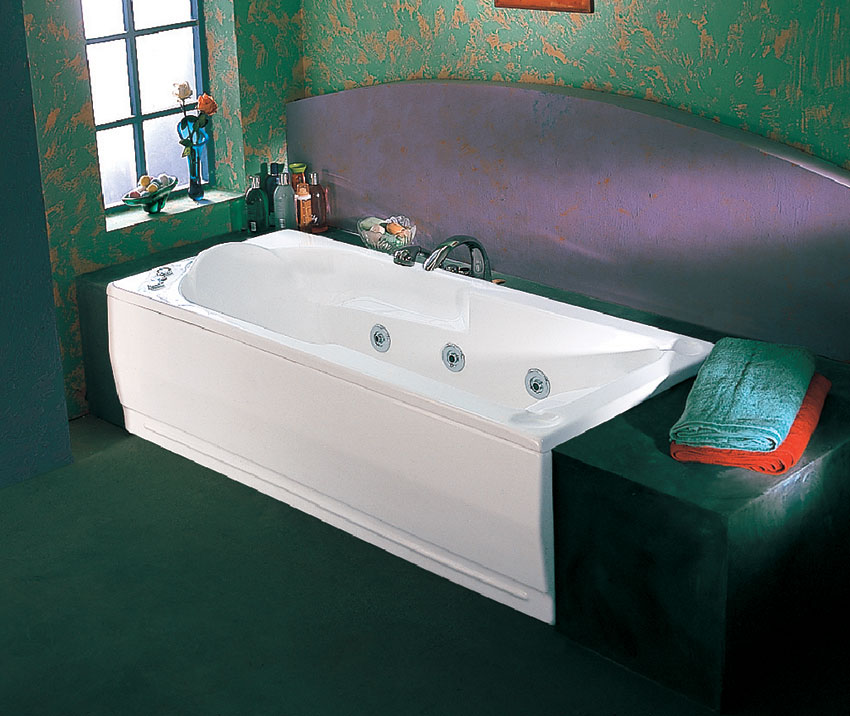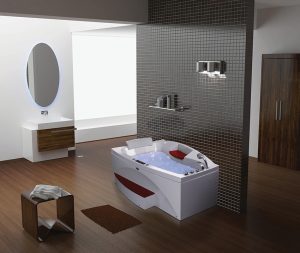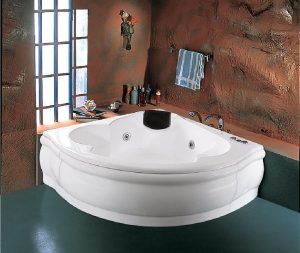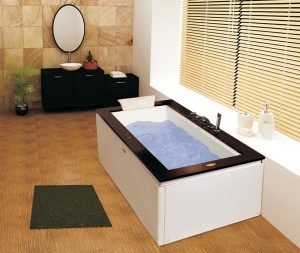When remodeling a bathroom, one of the biggest decisions is what material to use for the bathtub. Rectangular tubs are a popular choice because they fit well in most bathroom layouts. They provide ample bathing space while taking up less floor room than oval or round tubs.
With rectangular tubs, you have several material options, each with their own pros, cons, and maintenance requirements. Choosing the right material is an important decision that impacts the cost, durability, cleaning needs, and overall look of your tub. This article will discuss the most common materials used for rectangular bathtubs—acrylic, cast iron, engineered stone resin, and natural stone—to help you select the best option for your bathroom, needs, and budget.
Acrylic Bathtubs
Acrylic is the most affordable and widely available material for rectangular bathtubs. Acrylic tub walls are constructed from sheets of acrylic that are reinforced with layers of fiberglass for extra strength and rigidity.
Acrylic is a lightweight material, making acrylic tubs easier to maneuver into place than heavier cast iron or stone tubs. The average 5 foot acrylic rectangular tub weighs around 50kgs. This light weight also makes acrylic a good choice if you plan to install the tub on an upper level or second story of your home where a heavy stone or iron tub may require extra structural reinforcement.
In addition to affordability and lighter weight, easy cleaning and care is a major benefit of acrylic rectangular tubs. Acrylic has a non-porous surface that resists staining, scratches, and build up of soap scum and minerals. You can clean an acrylic tub with gentle cleaners and it won’t require the re-sealing that natural stone tubs need. Avoid abrasive cleaners or scrubbing pads which can dull the glossy acrylic surface over time.
One downside is that acrylic tends to show scratches and signs of wear more readily than other materials. The scratches won’t cause leaks or other functional problems, but can detract from the appearance. You’ll need to take care not to scratch the surface when cleaning.
Acrylic also provides a wide range of color options. From classic white to muted greys, warm biscuit tones, or even deep reds, blues, and greens, acrylic tubs allow you to add color to your bathroom. The color is consistent throughout the thickness of the acrylic sheet, so scratches don’t reveal white underneath.
Cast Iron Bathtubs
Cast iron rectangular tubs have a timeless charm and vintage aesthetic. The thick,glossy porcelain enamel coating gives cast iron tubs a deep, rich look.
Cast iron is an exceptionally durable material able to withstand decades of use with proper care. The thick iron holds heat from hot water longer than acrylic or resin tubs, making for a warmer,soakier bath.
On the downside, cast iron is extremely heavy. A standard 5 foot cast iron rectangular tub can weigh 200 pounds or more. Cast iron requires very sturdy floor support and professional installation. The weight also makes cast iron tubs harder to maneuver and get upstairs.
Porcelain enamel finishes can chip or scratch. Avoid abrasive cleaners and scouring pads. Over decades of use, the glossy finish may gradually dull. Professional re-enameling can restore the finish, but is costly.
Engineered Stone Resin Bathtubs
Engineered stone resin blends natural crushed stone (such as quartz) with polyester resins to create a durable composite material. Resin stone bathtubs offer the elegance of natural stone paired with resilient engineered qualities.
Stone resin tubs are thicker and heavier than acrylic, but lighter than cast iron or real stone. They have excellent heat retention, keeping bath water warm longer. The non-porous surface resists staining, etching, and build up of soap residue and hard water deposits. Most manufacturers add a glossy finish that maintains its shine longer than acrylic.
Compared to acrylic, stone resin tubs are highly scratch resistant. The material is also more flexible and less prone to chipping if hit. Microscopic scratches don’t show up readily due to the speckled stone pattern.
Natural Stone Bathtubs
For a true luxury bathroom, it’s hard to beat the elegance of a natural stone rectangular bathtub cut from marble, granite, or other quarry stone. Each stone tub is a unique work of art with beautiful veining, colors, and patterns no two are exactly alike.
Stone is very durable and retains heat extremely well. A marble or granite tub will keep bath water hot for a long relaxing soak. The smooth stone surface stays glossy for years with proper sealing and care.
The major downside (besides cost) is weight. A stone tub can weigh over 200kgs. Professional reinforcement is needed to support the weight without flexing or sinking over time. Stone tubs are best suited for ground floor or slab foundation installs.
The porous surface also requires diligent sealing to prevent staining and etching from minerals in water. Using a tub filler is recommended to avoid damage from taps. Maintain stone tubs with pH neutral gentle cleaners.
Choosing the Right Bathtub Material
With the variety of options for rectangular bathtubs, selecting the ideal material for your home comes down to a number of factors:
- Budget – Acrylic is the most affordable option. Cast iron,resin, and stone cost progressively more respectively. Set a budget to narrow choices.
- Usage – For a guest bath or tub used infrequently, acrylic or resin offer durable options. For heavy daily use, cast iron or stone hold up better long-term.
- Space Limitations – Heavy cast iron or stone work best on ground floors. Acrylic is lighter weight for upper levels or room conversions.
- Aesthetic – Do you want a sleek contemporary tub? Or vintage charm? Material impacts the look.
- Ease of Care – Acrylic and resin are the easiest to clean. Stone requires diligent sealing.
- Body aches – If you want soak away aches, heat retaining stone or cast iron help. For quick showers, acrylic works fine.
- Green Products – Our company uses recycled acrylic and resins for more eco-friendly tubs.
Take time to consider how you plan to use the tub, the bathroom layout, your personal style, and expected maintenance. This helps narrow down the many material options available in rectangular tubs. If budget allows, going up a tier from basic acrylic to resin, iron or stone gets you increased durability,warmth, and luxury.
Ask the manufacturer detailed questions before purchasing. Understand the specific care requirements to properly maintain that type of tub material. Also confirm the weight to ensure your floor can support it when full of water and people. Most companies provide information to help you determine the right support needs.
Investing in a quality bathtub, especially for a full bathroom remodel, is worth spending more upfront for durable and safe materials that will last for years of daily use. With proper care, your bathtub should serve your household well for a decade or longer. Choose rectangular sizing that efficiently uses the available layout, then select a material that best fits your overall goals for comfort, functionality, aesthetics and budget.
Get Best Rectangular Bathtub From Woven Gold India
The material you choose for a rectangular bathtub impacts nearly every aspect of user experience, from the feel of bathing to the effort of cleaning and maintaining. By understanding the pros and cons of acrylic, cast iron, engineered stone resin, and natural stone, you can make the most informed choice for your needs and home.
Key factors like weight, durability, heat retention, ease of cleaning, and cost help narrow the options. Acrylic provides the most budget-friendly and lightweight option, while natural stone offers the ultimate high-end luxury. Cast iron and stone resin offer qualities in between.
Take the time to carefully compare the materials before making a selection. Consider where the tub will be installed, how often it will be used, and your budget. With rectangular tubs in the most popular materials, you’re sure to find one that perfectly suits your bathroom at Woven Gold India




